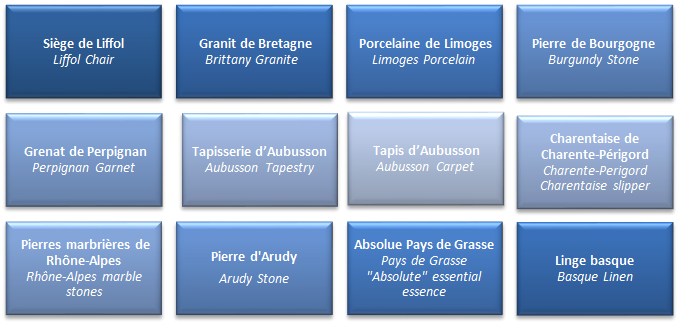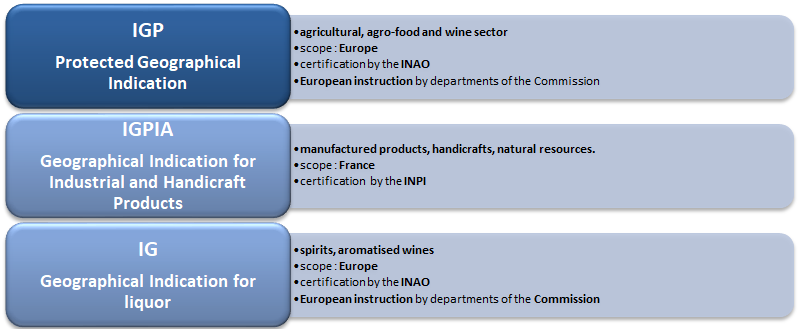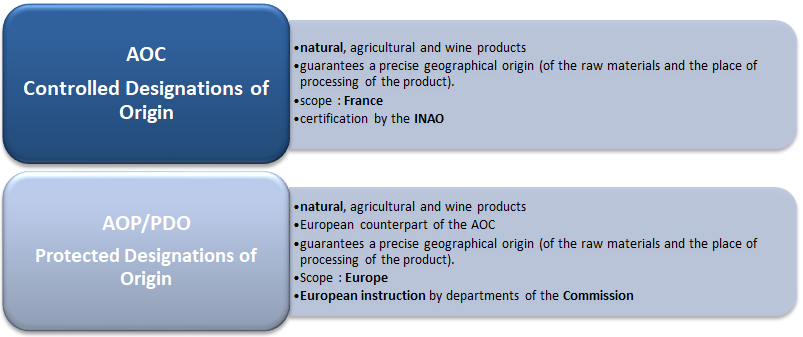Beau de Loménie | View firm profile
Last November the expressions “Linge Basque”, “Absolue Pays de Grasse” and “Pierre d’Arudy” joined the small family of Geographical Indications for Industrial and Handicraft Products or IGPIA. To date 12 Geographical Indications have been approved by the INPI. There are, however, two new applications for registration: “couteau de Laguiole” (Laguiole Knife) and “poteries d’Alsace” (Alsatian pottery) for which public inquiries for the registration of geographical indications have just been opened.

A Geographical Indication for Industrial and Handicraft Products, what is it about?
A geographical indication makes it possible to link a product to its origin. Its purpose is to protect pre-existing know-how and production.
Just like a trade mark, a Geographical Indication is a distinctive sign. It assures the consumer characteristics attributable to that geographical origin, which is a guarantee of the quality and authenticity of the product.
The WTO defined Geographical Indications in 1994 though Article 22:1 of the TRIPS Agreement* as ” indications which identify a good as originating in the territory of a Member, or a region or locality in that territory, where a given quality, reputation or other characteristic of the good is essentially attributable to its geographic origin.”
According to French law, the Geographical Indication of an Industrial and handicraft Product is defined in Article L.721-2 of the Intellectual Property Code as the « name of a geographical area or of a specific place used to designate a product – other than agricultural, forestry, food or seafood products – which originates from such area and which possesses a given quality, a reputation or other characteristics attributable mainly to this geographical origin”. This category of geographical indication, which is still little known to the public, was created by the so-called Loi Hamon of 17 March 2014. Previously only natural, agricultural and wine products could benefit from the national protection conferred on Geographical Indications.
This Geographical Indication is subject to a special approval procedure provided for in article L.721-3 of the French Intellectual Property Code. Contrary to the other official signs of quality and origin (SIQO), all administered by the INAO (National Institute of Origin and Quality), it is the INPI that rules on applications for approval or modification of the specifications of these particular appellations.
This approval includes, among other things, the elaboration of specifications which can be long and laborious to draw up. It has thus taken several years to reach an agreement between all the operating members of the “Porcelaine de Limoges Geographical Indication” association (i.e. Limoges porcelain manufacturers or decorators). For Marseille soap, the soap manufacturers have still not reached an agreement on specifications. Two associations defending different processes even filed an application for approval in 2015, neither of which was successful. The INPI also indicated on this occasion that it could only approve one application.
A Geographical Indication, what for?
Once the Geographical Indication has been approved, the concerned products, which comply with the specifications attached to the indication, may be marked with the name of this indication. IGPIAs are also referenced in a database of their own, freely accessible on the INPI website.
In addition, article L.722.1 of the French Intellectual Property Code provides in its sub-section b) that any violation of an IGPIA constitutes counterfeiting. It is therefore prohibited to “produce, offer, sell, place on the market, import, export, tranship, use or hold for these purposes goods whose presentation infringes or is likely to infringe a Geographical Indication. »
To give an example in the world of perfumery, there is Absolue de Grasse whose process of transforming flowers into “absolute essence” obtained the INPI certification last November. Since then, any seller of Absolue Pays de Grasse, or of a product identified as such, whose production, harvesting and processing stages were carried out outside the geographical area of the Alpes-Maritimes, Var and Alpes-de-Haute-Provence French departments can be prosecuted on the basis of counterfeiting.
A coexistence with other quality signs…
Geographical Indications include in the broadest sense not only French Geographical Indications for Industrial and Handicraft Products (IGPIA), Protected Designations of Origin (PDO), but also Controlled Designations of Origin (AOC), Protected Geographical Indications (PGI) and Geographical Indications for liquor (GI). PDOs, PGIs and GIs for liquor are all also regulated at EU level. These regulations have replaced national regulations, the CJEU having affirmed in the decision Budějovický Budvar (CJEU, 8 September 2009 (C 478/07, ECLI EU:C:2009:521) that the purpose of the European regulation was not “to establish, alongside national rules which may continue to exist, an additional system of protection for qualified geographical indications,…, but to provide a uniform and exhaustive system of protection for such indications”. At French national level, only the Geographical Indications of Industrial or Artisanal Products (IGPIA) remain, as these signs are not subject to European regulations.


Coexistence with trade marks…
Order n° 2019-1169 of 13 November 2019, which transposed the 2015 Directive, incorporated into French law absolute and relative grounds for refusal or cancellation of trade marks infringing geographical indications for manufactured products and, more broadly, official signs of quality and origin.
IGPIAs therefore now constitute, together with the new Article L. 711-2 (9°) of the French Intellectual Property Code, an absolute ground for the cancellation or refusal of a trade mark. The INPI will have the possibility to refuse a trade mark registration if it infringes a Geographical Indication taken in its broadest sense. The INPI could previously only refuse the registration of a trade mark if it was “of such a nature as to deceive the public as to the nature, quality or geographical origin of the product or service.”
As far as relative grounds are concerned, the Geographical Indications for Industrial and Artisanal Products (IGPIA) have been added to the list of prior rights which may allow the cancellation of a registered trade mark or the refusal of an application for registration. This provision, which can be found at 5° of article L.711-3 of the Intellectual Property Code, had already been introduced into the Intellectual Property Code in 2014 by the so called Loi-Hamon law (in former article L.711.4).
Since the entry into force of the Order, IGPIAs have been now included in the list of prior rights that can be invoked in the new opposition procedure (article L.712-4 of the Intellectual Property Code).
The protection of Geographical Indications for manufactured products stops for the moment at the borders of France, but it may in the future extend to the borders of Europe, as the European Commission is currently studying the extension of the protection of Geographical Indications to non-food products.